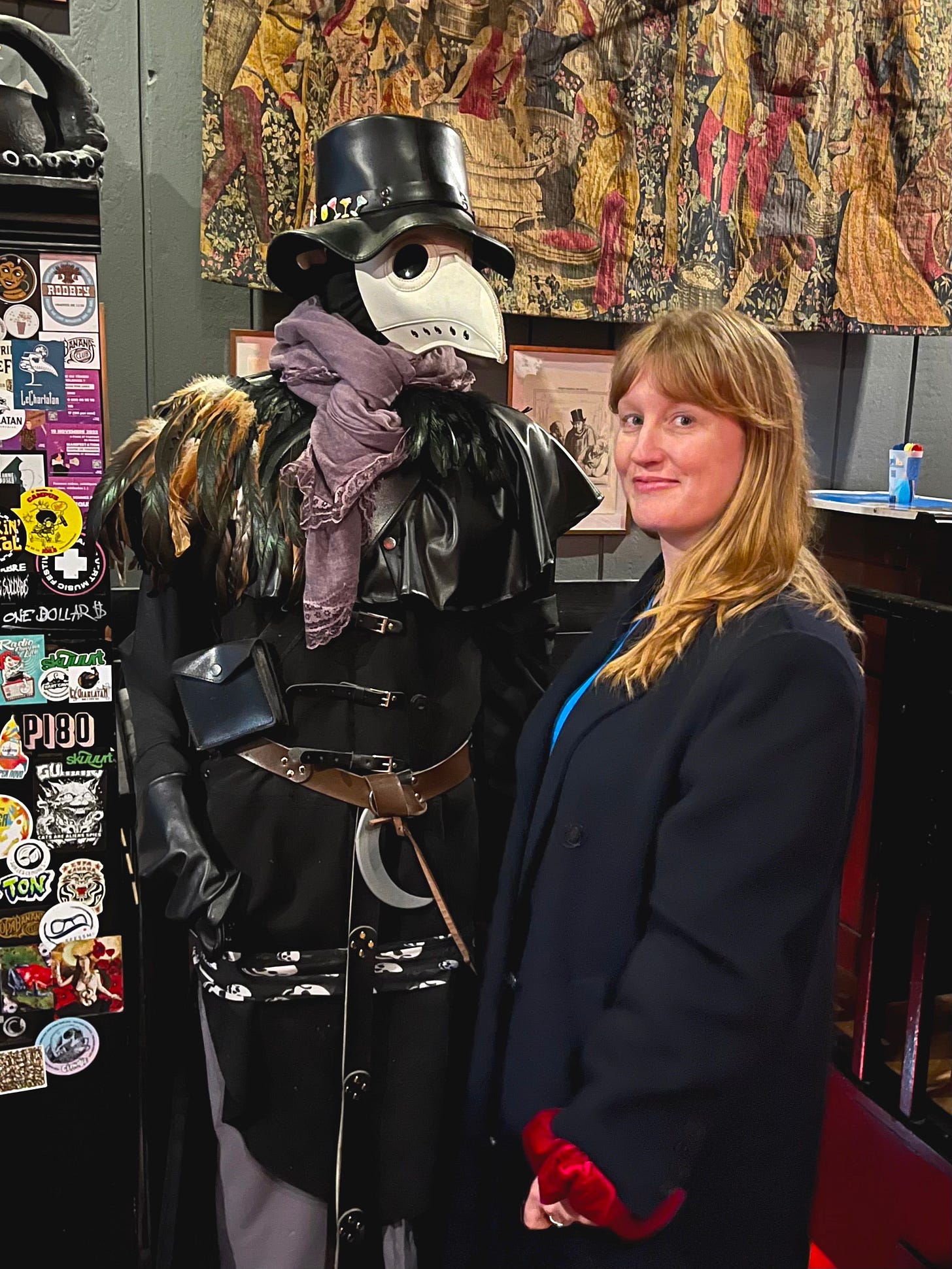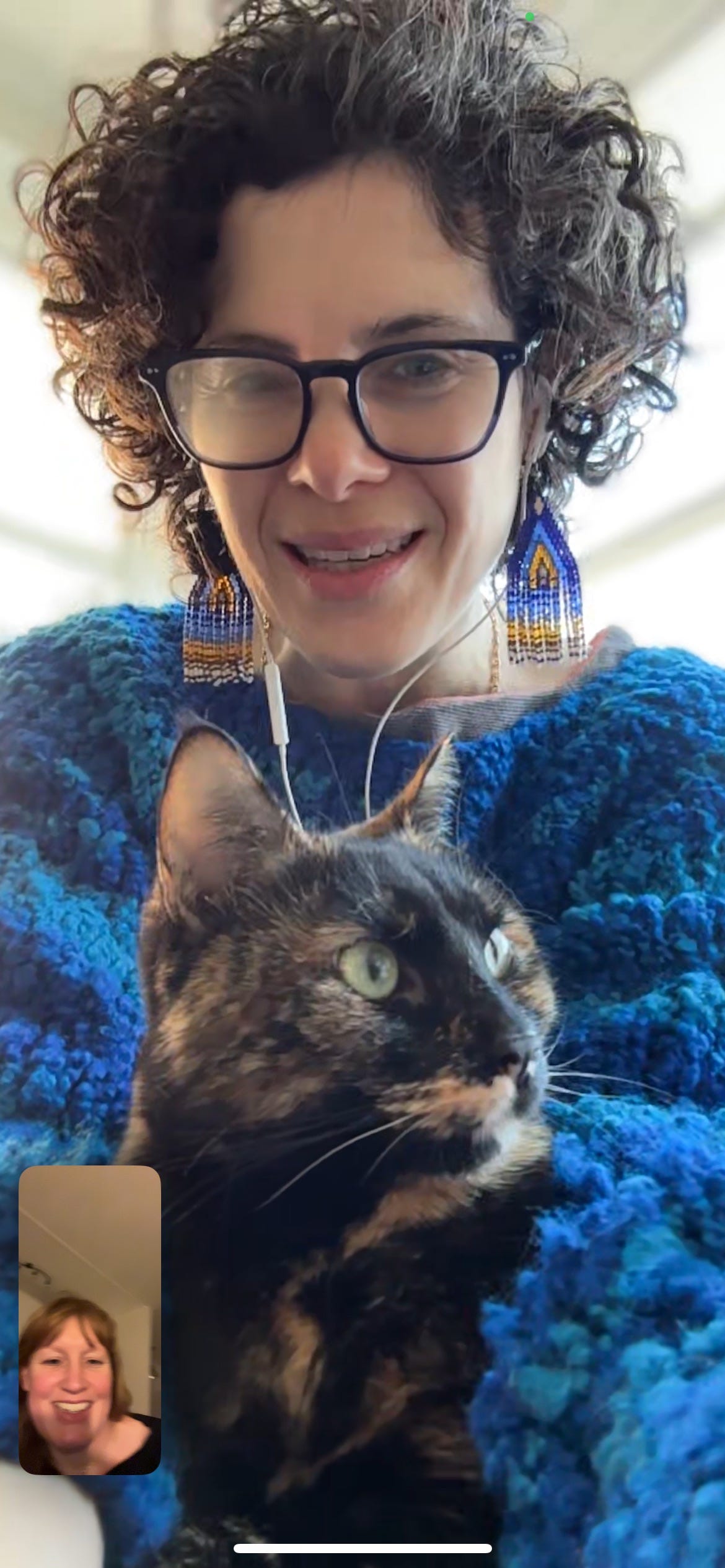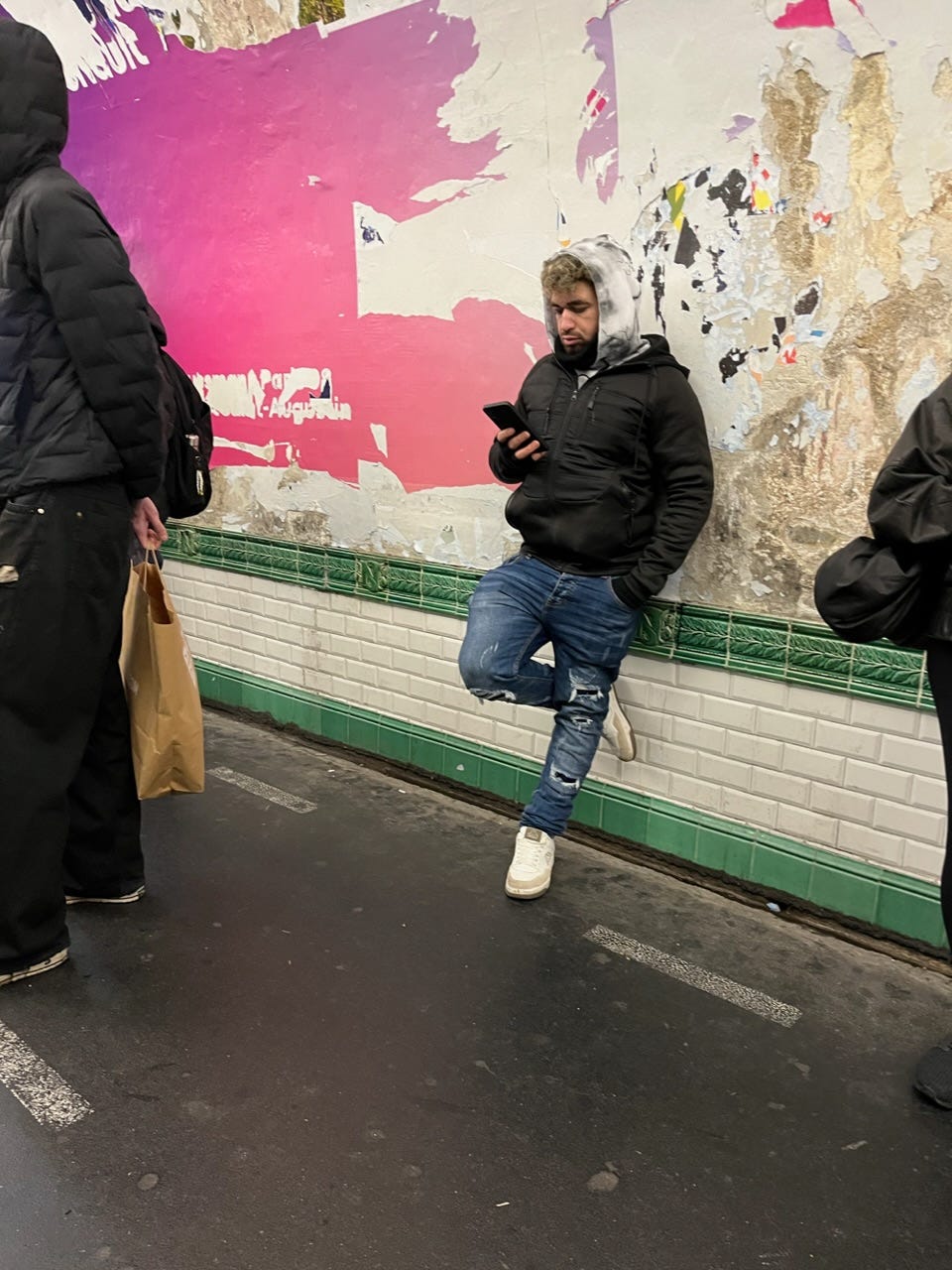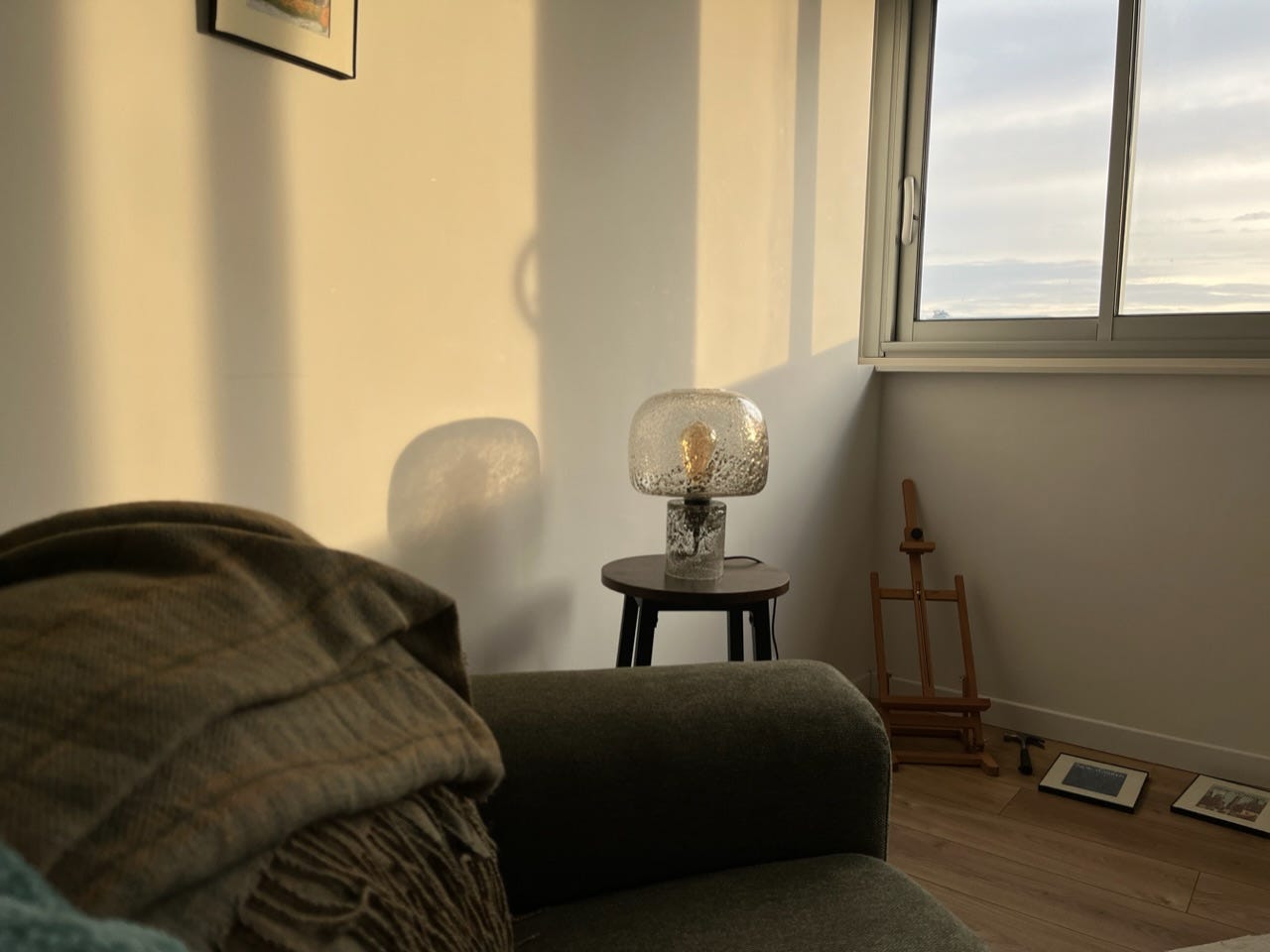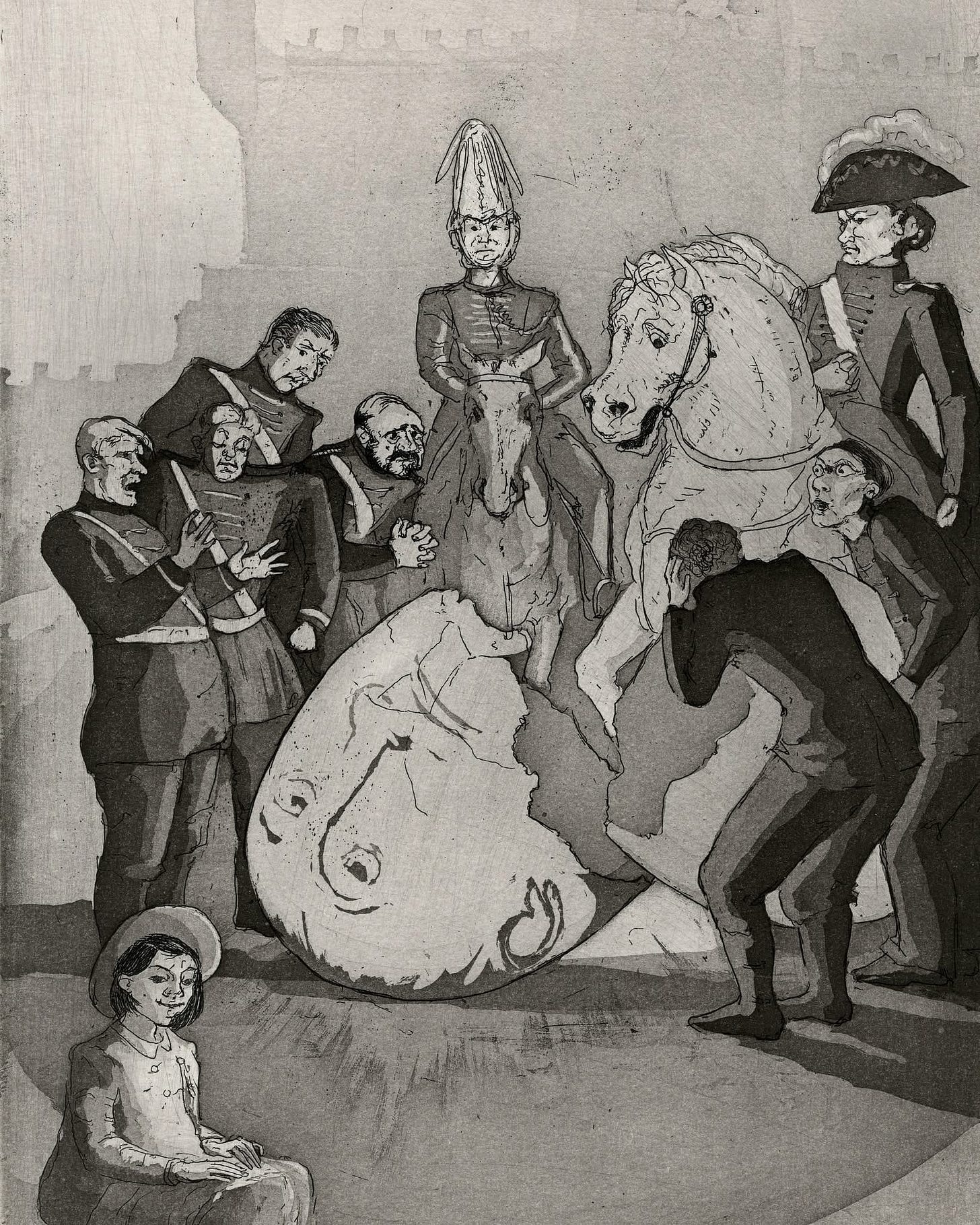On Language as Homeland, a Sash-Throwing Yukata Striptease, and Puns as the Great Savior
Also: a plague doctor.
Big week.
Me and my delightfully oversized wool coat hung out with a plague doctor, for one.
If I look awkward it’s because I didn’t actually ask for this photo, but someone wanted me to take it.
I pretended I was in Brunswick, ME (home of my alma mater), for a few moments and that was nice.
Couching Our Behavior:
I got a couch last week, after six weeks in my new apartment without a couch, and four months without a couch overall.
There’s that whole sociological conversation about “third places,” how humans need a place to rest and socialize outside home and work. But, hell, let’s talk about needing a “third place” within your own home. There’s your bed, your kitchen, and you ALSO need a distinct third place in which to nest, preferably one which offers requisite plushness, in/on which to read, spiral, and melt while rewatching Friends and only caring a LITTLE that people think that Friends-watchers are basic, even though as I argued in a former piece, that theory only holds if you have seasons 5-10 in mind.
Also, it helps if your plush Third Place is olive green, well-upholstered, and happens to be a convertible couch so that your friends From Afar can come visit and remind you that you are not a piece of driftwood on the beach, but you come from a place (or places) where you are known!
Sometimes, nestled in your Third Place of an afternoon, you can FaceTime your friend Cassie, and you’ll immediately remember that the fabulous azure sweater that she’s wearing, she knit herself, and that the cat in her lap, Kiwi, is one that you cat-sat last year. Kiwi walked across your keyboard during a Microsoft Teams meeting with your boss. Cassie will take you on a little sunlit, snow-covered walk around her town in New Jersey.
Talking to her, you remember the concept for a film that you’d had a couple of years ago, and you both agree that the premise is absurd and promising, and since you both love screwball comedies, you also agree that it would fold neatly into that genre. You thought you’d forgotten the premise, how nice that that isn’t the case!
Language Itself Is a Homeland
I was reminded again that one’s language is one’s home, as much as any physical place. English is my home. It’s a landscape I know and abide in. I know the hills and nooks and streams. Japanese is another home, very familiar, if (of course) not as familiar as my native one.
I was in Paris a few weeks ago celebrating New Year’s at a party full of Bretagne dancing and centuries-old bag-pipey instruments. Dancing is a language I know. The repartee in French with partners during dances was one I didn’t.
I did, though, get to tell an older woman she looked like the spitting image of Charlotte Rampling, because she did, and her friends enthusiastically agreed and asked why I know that actress since I should be too young to. I also met my friend Kate for an eight (8) hour gabfest — Kate is one of the smartest people I know, and thanks to her Irish father’s side is a first-rate storyteller. On my third and last day in Paris, I found myself in a Japanese district. I was looking for a highly-rated onigiri 🍙 takeaway place, and then was amazed to see twenty other Japanese restaurants a stone’s throw away.
I landed on an udon place, since udon is one of my mainstays. The older man sitting next to me heard me speak Japanese to the waiter, then leaned over and asked me in Japanese what my background with the language is, and then spoke with me for the rest of my time there. When I was in the bathroom, he sneakily paid for my lunch.
He told me that he was a retired high school teacher who was born and had lived his whole life in a little village at the very base of Mt. Fuji. He showed me a picture of the eponymous mountain. “This is what I’ve seen every day!”
He’d just been in Poland at a friend’s New Year’s party and was en route to the airport to go back home to Japan that evening.
He told me he’d been to the prefecture where I’d lived, Toyama, because the student ping pong team he’d coached had made it to a national tournament.
Japanese, I don’t have to think about much when I speak it. I don’t have to think about how I arrange my body, because I’m so used to inhabiting the form you take when you speak Japanese. It’s not just language (no language is). It’s also particular forms of displaying attention, particular ways of making light conversation, friendly jokes, signaling a shared understanding. So much of language is physical, sub-lingual.
The man turned to me, and spoke to me, and that was it. I didn’t have to think during our conversation, and it was nice not to have to think. It’s not like that the rest of my time.
When I visited London in late November for a friend’s lecture, I realized as soon as I crossed the border that language itself is its own territory and country.
While by outward aspects France looks similar to where I came from (the northeastern U.S.), I had not realized how my lack of fluency in the language made me feel “not-at-home,” and not in a minor way, either. It’s a constant state of confusion and alien-ness familiar to anyone who’s been an immigrant.
What tipped me off was being flooded with joy and relief when seeing advertisements in English in the London Tube. London is so international that you can hear three or five languages in five minutes in your train car alone. But maybe half of the other conversations will be in English, so you can eavesdrop. I stayed with an English friend with whom I spoke for hours, both of us rapidly shooting off jokes and asides and insights, from breakfast onward. I had forgotten I was capable of that. I felt I’d been mute the past two months. I felt like I was flying, which is how I feel when I speak with people who are very alive and very smart and very funny and very introspective.
Suddenly being restored with the ability to show my (true) self, which is someone who’s quick with a joke — and, equally crucially, being able to understand people’s jokes and patter and asides — made me realize how much I’d missed having “thoughtless” native-English exchanges with people.
With Japanese, it was of course a learning process for me, learning how to be “light” and humorous with my speech (the biggest challenge in any language).
There were plenty of times when I tried to make jokes and they landed like a lead balloon. Working in staff-rooms with fellow public-school teachers, I realized that one form of humor — sarcasm, for which there’s hardly a term in Japanese, although the closest work might be 皮肉, hiniku, but that feels too heavy a word — is a no-go.
“New York” humor, which is my native humor and which is also steeped in dryness (if something can be “steeped in dryness”) and a winking “you get me” kind of feel just doesn’t land in Japan, so I don’t advise it. When you make a fake-subversive joke, it is received as if you are actually subversive and offensive. “Black” (morbid) humor exists, of course, but in its own refined and delicate form and one I don’t venture into anymore.
It’s a tightrope walk.
Speaking of tightrope-walking, there were a thousand other ways to make jokes in Japan aside from sardonic humor, and I had to acquaint myself with some of them.
Physical humor is big in Japan, as anyone with a passing familiarity of Japanese TV will attest. One of my favorite memories of my existence involves a 60-year-old teaching colleague at the middle school where I worked in 2008.
Kagi-sensei — Mr. Kagi — was about to retire. He was compact and athletic and blustery, and had a Mel Brooks voice, and bushy (geji geji) black eyebrows and a completely bald pate which always shone. This story involves one of our enkai (work dinners, though that’s too staid a phrase for what work dinners are in Japan).
It was a Friday night. We were staying at a traditional Japanese inn, and Kagi-Sensei had had a lot of beer by that point (the custom there is to circulate the room and refill other people’s drinks as a way to show respect. Mr. Kagi had been shown a LOT of respect by a LOT of people, he was actually drowning in respect).
The lights were low. Most of us were arranged sitting seiza (kneeling) each next to our own low tables around the perimeter of the room.
Mr. Kagi, never one to shy from the limelight, and as I said, full up on drink, got up and swayed over to the very middle of the room, and started to play-act being a geisha, Vaudeville-style. Or, no: Burlesque.
We were all wearing our yukata (light robes) provided by the inn, tied with sashes at our waists, and as he danced and sang a geisha’s song in a terrible wolf-like howl (imagine Mel Brooks singing) and batted his eyelashes theatrically and coquettishly, he slowly untied his sash to a growing uproar from the rest of us.
He threw his sash on the floor and, still doing the bit, dancing and singing, pretended to totter across it like a tightrope. He almost fell off a few times but carried on.
It was glorious.
When he’d had enough of his geisha act, he decided it was time to head up to his room (or maybe he was ushered along by friendly coworkers).
The issue was that in the meantime, maybe during the dance, he had lost his room key. The word for “key” is kagi, so when “Kagi-sensei” lost his keys, it crossed over into truly astronomical levels of absurdity.
I don’t know that French people do fake stripteases in front of their coworkers in a way that is also somehow completely non-threatening, but then I have never been to a work party in France.
Kate, veteran of French living, told me this week that one main form of social currency in France is one’s ability to make a pun. “Great!” I said. With a look of horror, she specified: “No, but like, really bad puns. Terrible, unforgivable puns.”
I told her that in my book, there is NO SUCH THING as a bad pun, and I meant it.
I also told her that one of my favorite puns in Japanese is one that six-year-olds would tell. (“Mittsu no gengo hanasemasu yo. Nihongo to, Eigo to, ringo!” It’s seriously so embarrassing I won’t translate it). I used to buy books of jokes as a kid — including a two-pound compendium by Milton Berle, as other ten-year-olds do — and when I tell you how excited I was to read jokes like “What has four wheels and flies?” “A garbage truck.” (Okay, to be fair, THAT joke didn’t excite me, but you get the idea).
I love puns. My home is a place where I can make puns.
Yesterday evening, I was looking for another file on Google Drive when I came across a multi-page document wherein I recorded teachers’ jokes and AIM conversations in high school and college (2001ish to 2004ish). I have no idea how I managed to save that document across multiple computers and to still have it today.
What I learned from reading our conversations is that we were MUCH cleverer at seventeen than I remember. No emotional maturity, sure, but that didn’t stop us from having fun with wordplay.
To wit: I found this exchange with someone. I’m peachsncoyne (obviously), they were “ToxicSmock.”
I hope you enjoy the comic sans font.
And here was a group of quotes from my summer writing program at Columbia. Yes, we were nerdy, but also apparently very funny. Ryan and Leslie were our professors, the rest of us were high schoolers.
Perhaps one day I will be good enough at French to make a pun and thus ingratiate myself with the French in a French-approved way. For now, I just smile weakly and hope for the best, and sometimes open my mouth, with a high likelihood of thereafter unintentionally offending someone. It’s formidable (“great”).
Seen and Overheard:
This man waiting for the subway in Paris, whose hood blended in with the palimpsest of posters behind him.
Daylight, which is not an oft-experienced phenomenon where I live, on the Couch of which I spake.
An amazing and probably famous park in Paris that I happened into while trying to get some good coffee from a chain called Maison Kitsuné (kitsuné means “fox” in Japanese). My friend Eugenia introduced me to MK back in New York. Also that day I had GOOD bubble tea from Yi Fang, a Taiwanese chain. GOOD bubble tea is almost impossible to find in France. Good Asian food, period. It was a very good day.
Moonrise at about 3 PM.
The circumstances in which I met the plague doctor: visiting a bar whose decor was “Plague.”
Apt image of what’s happening in America right now. (Illustration by Dame Paula Rego, sometime last century).
- - - - - - - - -
Thanks, as ever, for reading. If you LIKE this post (the little heart), it will mean a lot to me to signal that you’re a reader.
If you have any FAVORITE PUNS, please share them in the comments. I am so not kidding. French or Japanese puns are also welcome.
If you don’t want to become a paying subscriber, but you do want to show love and respect for the effort I put into entertaining you today with my newsletter, you can do so here, and that would be appreciated, too!




